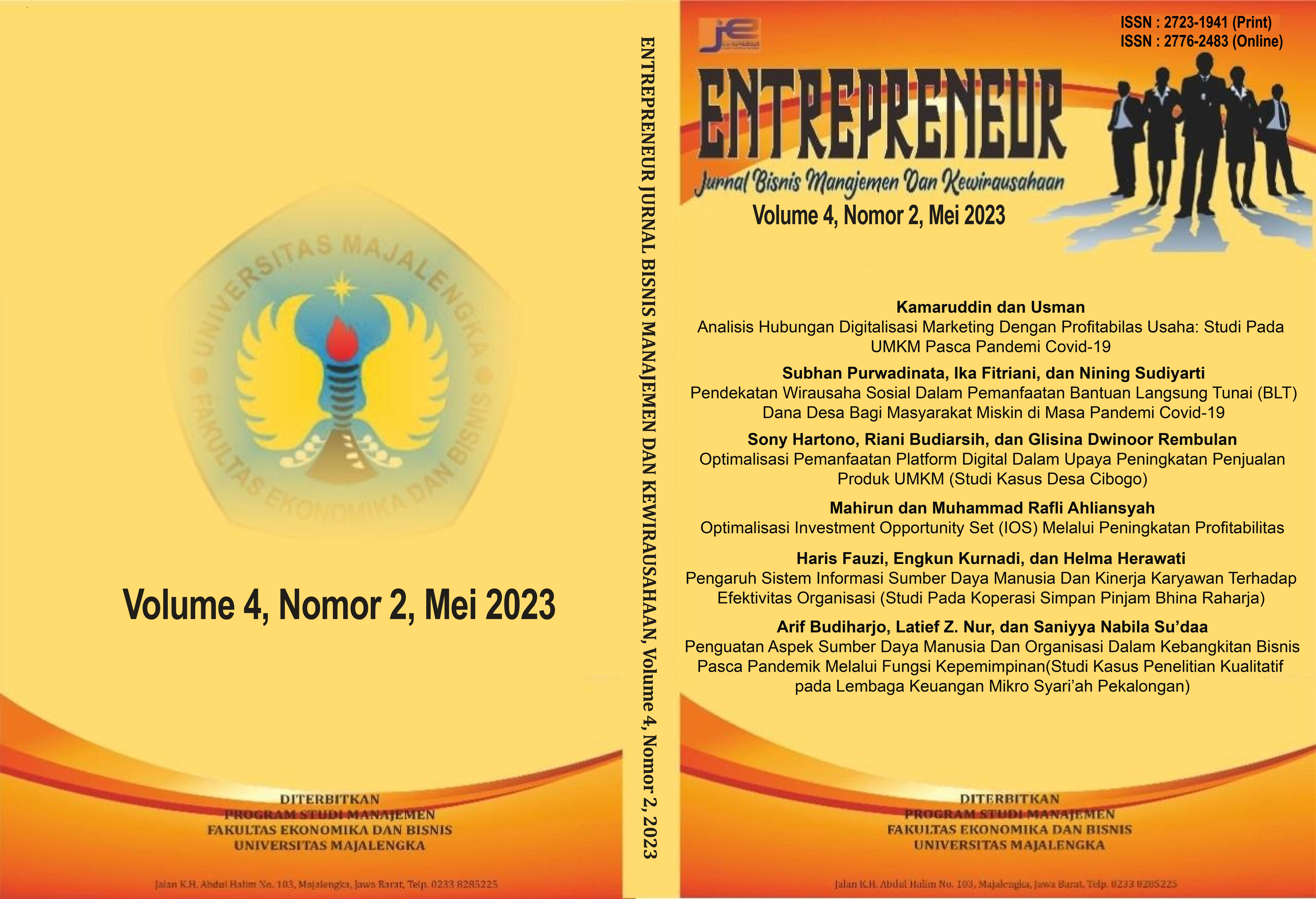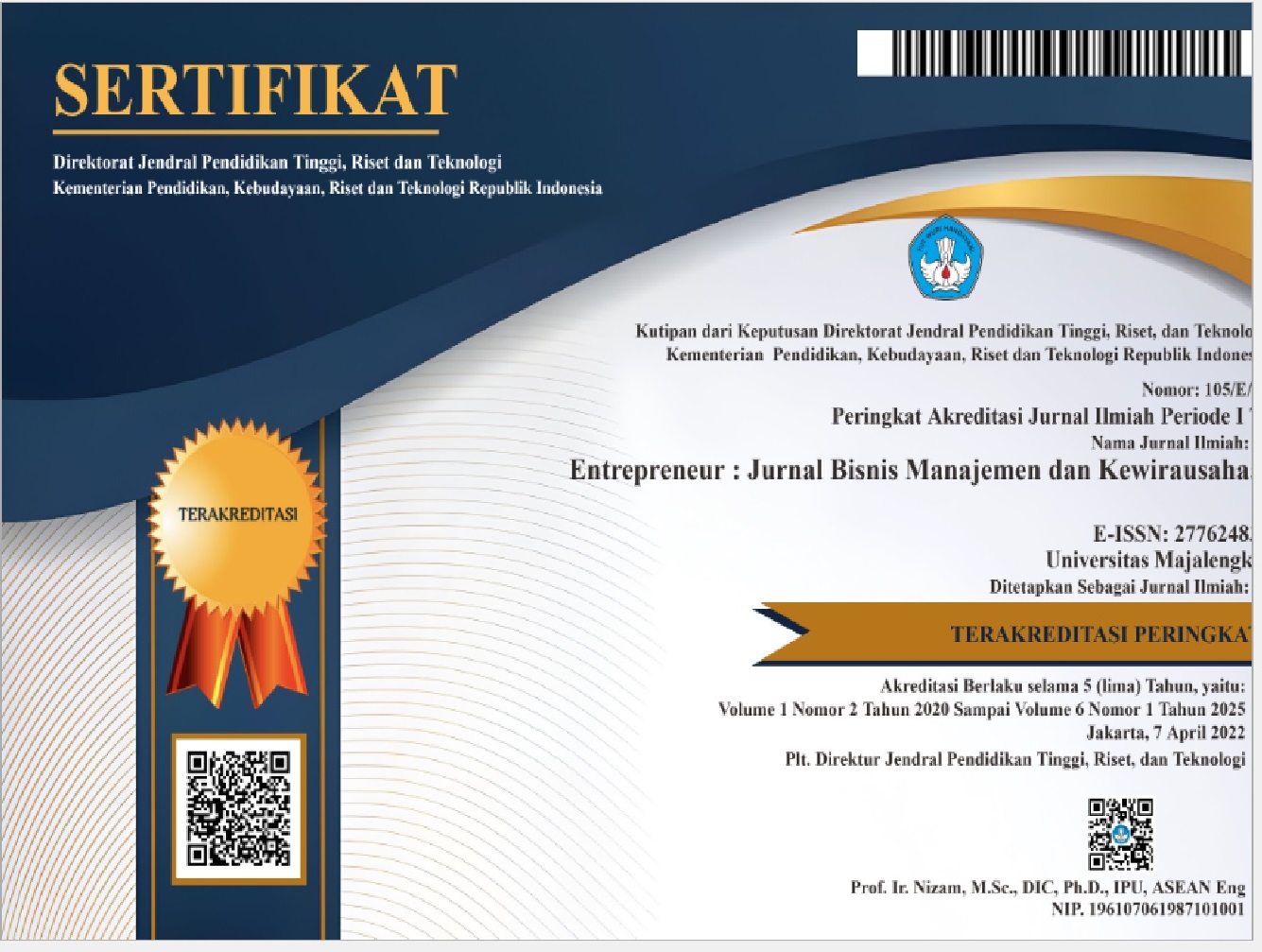Pengaruh Personality Traits dan Individual Performance Terhadap Perilaku Intrapreneurial Karyawan pada Shopee Xpress Yogyakarta Hub
DOI:
https://doi.org/10.31949/entrepreneur.v4i2.5124Abstract
Intrapreneurial behaviour is an approach at the individual level that is carried out in a bottom-top manner by employees. Personality traits and individual performance are important to note in an organization to see whether these two things can encourage employees to have intrapreneurial behavior that can benefit the organization. This study used data collection methods through questionnaires using a sample of 67 respondents. The data that has been collected is then processed using the Statistical Package for Social Science (SPSS). The results of this study show that personality traits have a positive effect on intrapreneurial behavior and individual performance has a positive effect on intrapreneurial behavior. Furthermore, personality traits and individual performance simultaneously have a positive effect on intrapreneurial behaviour.
Keywords:
Personality Traits, Individual Performance, Intrapreneurial BehaviorDownloads
References
Almasri, O. R., & Ahmad, A. M. K. (2020). Intrapreneurial behaviors and innovative performance: the moderating role of employees’ characteristics in commercial banks. Accounting, 6(6), 1021–1032. https://doi.org/10.5267/j.ac.2020.7.018
Alt, E., & Craig, J. B. (2016). Selling Issues with Solutions: Igniting Social Intrapreneurship in for-Profit Organizations. Journal of Management Studies, 53(5), 794–820. https://doi.org/10.1111/joms.12200
Andreas Aldo Gunawan, & HP. Sunardi. (2016). PENGARUH KOMPENSASI DAN DISIPLIN KERJA TERHADAP KINERJA KARYAWAN PADA PT GESIT NUSA TANGGUH. Jurnal Ilmiah Manajemen Bisnis, 16(1), 1–7.
Anupama Gupta, & Dr. Nidhi Srivastava. (2013). An Exploratory Study Of Factors Affecting Intrapreneurship. International Journal of Innovative Research & Development, 2(8), 1–8. www.ijird.com
Badoiu, G. A., Segarra-Ciprés, M., & Escrig-Tena, A. B. (2020). Understanding employees’ intrapreneurial behavior: a case study. Personnel Review, 49(8), 1677–1694. https://doi.org/10.1108/PR-04-2019-0201
Berzin, S., & Pitt-Catsouphes, M. (2015). Social Innovation from the Inside: Considering the “intrapreneurship” Path. In Social Work (United States) (Vol. 60, Issue 4, pp. 360–362). Oxford University Press. https://doi.org/10.1093/sw/swv026
Blanka, C. (2019). An individual-level perspective on intrapreneurship: a review and ways forward. Review of Managerial Science, 13(5), 919–961. https://doi.org/10.1007/s11846-018-0277-0
Boon, J., Van der Klink, M., & Janssen, J. (2013). Fostering intrapreneurial competencies of employees in the education sector. International Journal of Training and Development, 17(3), 210–220. https://doi.org/10.1111/ijtd.12010
Chouchane, R., Fernet, C., Austin, S., & Karoui Zouaoui, S. (2021). Organizational support and intrapreneurial behavior: On the role of employees’ intrapreneurial intention and self-efficacy. In Journal of Management and Organization. Cambridge University Press. https://doi.org/10.1017/jmo.2021.14
Edú Valsania, S., Moriano, J. A., & Molero, F. (2016). Authentic leadership and intrapreneurial behavior: cross-level analysis of the mediator effect of organizational identification and empowerment. International Entrepreneurship and Management Journal, 12(1), 131–152. https://doi.org/10.1007/s11365-014-0333-4
Foss, N. J., Lyngsie, J., & Zahra, S. A. (2015). Organizational design correlates of entrepreneurship: The roles of decentralization and formalization for opportunity discovery and realization. Strategic Organization, 13(1), 32–60. https://doi.org/10.1177/1476127014561944
Gawke, J. C., Gorgievski, M. J., & Bakker, A. B. (2018). Personal costs and benefits of employee intrapreneurship: Disentangling the employee intrapreneurship, well-being, and job performance relationship. Journal of Occupational Health Psychology, 23(4), 508–519. https://doi.org/10.1037/ocp0000105
Heinze, K. L., & Weber, K. (2016). Toward organizational pluralism: Institutional intrapreneurship in integrative medicine. Organization Science, 27(1), 157–172. https://doi.org/10.1287/orsc.2015.1028
John, O. P., & Srivastava, S. (1999). The Big-Five Trait Taxonomy: History, Measurement, and Theoretical Perspectives. In Handbook of Personality: Theory and Research (2nd ed.) (2nd ed., pp. 1–71). Guilford.
J.P.J. de Jong, S.K. Parker, S. Wennekers, & C. Wu. (2011). Corporate Entrepreneurship at the Individual Level: Measurement and Determinants (No. H201108).
Koopmans, L., Bernaards, C. M., Hildebrandt, V. H., De Vet, H. C. W., & Van Der Beek, A. J. (2014). Construct validity of the individual work performance questionnaire. Journal of Occupational and Environmental Medicine, 56(3), 331–337. https://doi.org/10.1097/JOM.0000000000000113
Mahmoud, M. A., Ahmad, S., & Poespowidjojo, D. A. L. (2020). Intrapreneurial behavior, big five personality and individual performance. Management Research Review, 43(12). https://doi.org/10.1108/MRR-09-2019-0419
Parker, S. C. (2011). Intrapreneurship or entrepreneurship? Journal of Business Venturing, 26(1), 19–34. https://doi.org/10.1016/j.jbusvent.2009.07.003
Pramodita Sharma, & James J. Chrisman. (1997). Toward a Reconciliation of the Definitional Issues in the Field of Corporate Entrepreneurship. Entrepreneurship Theory and Practice, 23(3), 11–27.
Prof. Dr. H. Imam Ghozali, M. Com. (2011). Aplikasi Analisis Multivariate Dengan Program IBM SPSS 19 (5th ed.). BP Universitas Diponegoro.
Rahmah, M., & Fatmah, D. (2019). Impact Organizational Culture and Intrapreneurship Employees on Work Discipline Employees in Brangkal Offset. Jurnal Ilmu Manajemen Dan Bisnis, 10.
Rigtering, J. P. C., & Weitzel, U. (2013). Work context and employee behaviour as antecedents for intrapreneurship. International Entrepreneurship and Management Journal, 9(3), 337–360. http://ssrn.com/abstract=2212060Electroniccopyavailableat:http://ssrn.com/abstract=2212060
Sinha, N., & Srivastava, K. B. L. (2013). Association of Personality, Work Values and Socio-cultural Factors with Intrapreneurial Orientation. Journal of Entrepreneurship, 22(1), 97–113. https://doi.org/10.1177/0971355712469186
Stull, M. G. (2005). INTRAPRENEURSHIP IN NONPROFIT ORGANIZATIONS: EXAMINING THE FACTORS THAT FACILITATE ENTREPRENEURIAL BEHAVIOR AMONG EMPLOYEES.
Taştan, S. B., & Güçel, C. (2014). Explaining Intrapreneurial Behaviors of Employees with Perceived Organizational Climate and Testing the Mediating Role of Organizational Identification: A Research Study among Employees of Turkish Innovative Firms. Procedia - Social and Behavioral Sciences, 150, 862–871. https://doi.org/10.1016/j.sbspro.2014.09.095
Woo, H. R. (2018). Personality traits and intrapreneurship: the mediating effect of career adaptability. Career Development International, 23(2), 145–162. https://doi.org/10.1108/CDI-02-2017-0046

Published
How to Cite
Issue
Section
License
Copyright (c) 2023 Deliani Azmi Zakiah Ahmad, Ratih Purbasari, Margo Purnomo

This work is licensed under a Creative Commons Attribution-ShareAlike 4.0 International License.
COPYRIGHT NOTICE
An author who publishes in the Entrepreneur: Jurnal Bisnis Manajemen dan Kewirausahaan agrees to the following terms:
1. Author retains the copyright and grants the journal the right of first publication of the work simultaneously licensed under the Creative Commons Attribution-ShareAlike 4.0 License that allows others to share the work with an acknowledgment of the work's authorship and initial publication in this journal
2. The author is able to enter into separate, additional contractual arrangements for the non-exclusive distribution of the journal's published version of the work (e.g., post it to an institutional repository or publish it in a book) with the acknowledgment of its initial publication in this journal.
3. The author is permitted and encouraged to post his/her work online (e.g., in institutional repositories or on their website) prior to and during the submission process, as it can lead to productive exchanges, as well as earlier and greater citation of the published work







